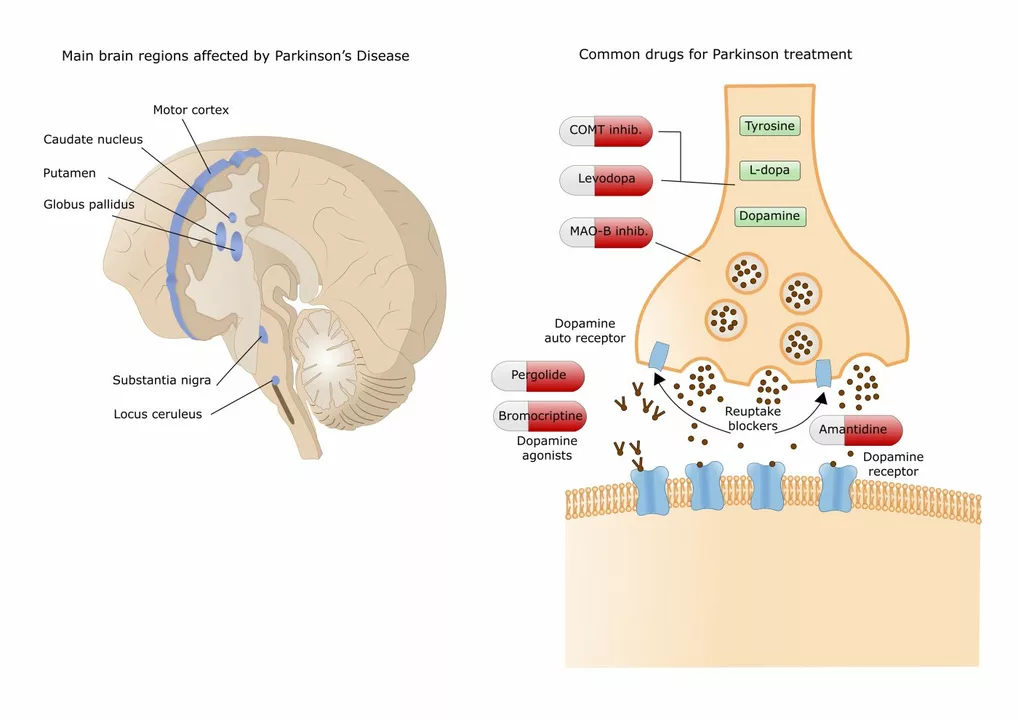Trihexyphenidyl: What It Does and How to Use It Safely
Trihexyphenidyl (often sold as Artane) is an anticholinergic medicine used to reduce tremor and stiffness in Parkinson’s disease and to treat drug-induced movement problems from some antipsychotics. It can work well for tremor and drooling, but it also brings side effects many people notice right away. Here’s clear, practical info so you know what to expect and how to stay safe.
How trihexyphenidyl helps
This drug blocks certain brain signals that cause muscle stiffness, tremor, and involuntary movements. For people with early Parkinson’s symptoms or antipsychotic-induced extrapyramidal symptoms, trihexyphenidyl can reduce shaking and make daily tasks easier—like writing, buttoning shirts, and eating without spilling.
It usually works within days, but full benefit can take a few weeks. Doctors tailor the dose to balance symptom relief with side effects, since some people are more sensitive than others.
Common side effects and safety tips
Expect some anticholinergic effects. The most common are dry mouth, blurry vision, constipation, and difficulty urinating. Some people feel drowsy, dizzy, or confused—this is more likely in older adults. If you have glaucoma, severe prostate enlargement, or certain heart conditions, trihexyphenidyl may not be a good choice.
Simple safety tips:
- Start low and go slow. Follow your prescriber's dose changes and never double up without advice.
- Avoid driving or heavy machinery until you know how it affects you—drowsiness and blurred vision happen.
- Drink water and use sugar-free candy for dry mouth. Eat more fiber and stay active to prevent constipation.
- Be careful in hot weather—this medicine can reduce sweating and raise the risk of overheating.
Mixing trihexyphenidyl with other anticholinergics (some antihistamines, certain bladder meds) can increase side effects. It also works against drugs like donepezil used for dementia. Tell every doctor and pharmacist you see that you take trihexyphenidyl so they can check for interactions.
If you notice confusion, hallucinations, rapid heartbeat, worsening urinary retention, or severe vision problems, contact your healthcare provider right away. Older adults should be monitored closely—anticholinergic drugs can worsen memory and thinking.
Stopping suddenly isn't usually dangerous, but don’t change your dose without checking with your prescriber. They may advise a gradual change if needed. If you’re switching antipsychotics or starting new meds, ask about the risk of movement problems and whether trihexyphenidyl is a good short-term option.
If you’re shopping online, buy from a licensed pharmacy and keep prescriptions and records. Ask the pharmacist about generic vs brand names and how to store the tablets. When used carefully and under a doctor’s supervision, trihexyphenidyl offers real relief for tremor and drug-induced movement issues—just watch for anticholinergic effects and get medical advice when anything feels off.
As a blogger, I recently came across an intriguing topic - the potential of Trihexyphenidyl and music therapy in improving motor function for those suffering from Parkinson's disease. Trihexyphenidyl, an anticholinergic medication, has shown promise in alleviating motor symptoms in Parkinson's patients, while music therapy has been known to help with movement and coordination. Combining these two approaches could potentially offer a more effective treatment option for patients dealing with this debilitating condition. I am eager to explore this topic further and share my findings with my readers, as it could provide hope for those struggling with Parkinson's disease and their loved ones. Stay tuned for my in-depth analysis on the effectiveness of Trihexyphenidyl and music therapy in enhancing motor function in Parkinson's patients.

